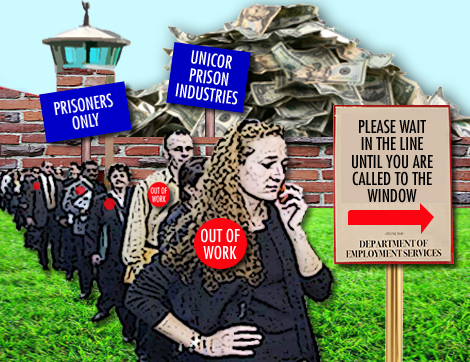
•With 8% unemployment, why are prisoners working while citizens aren’t?
By Keith Johnson
As if American businesses don’t have enough trouble competing with free traders, who exploit cheap labor in third world countries to make sizable profits, they are also forced to fight government-run corporations that pay prisoners pennies on the dollar to manufacture cheap goods and undercut private industry.
Is it any wonder that the United States has the highest rate of incarceration in the industrialized world? According to a recent report on cable news, the U.S. government is using federal prison inmates to steal business away from civilian manufacturers by producing comparable merchandise for pennies on the dollar.
At the very heart of this scheme is Federal Prison Industries, or Unicor, a U.S. government-owned corporation that employs 13,000 prisoners at slave wages to produce everything from windbreakers to solar panels. Although the agency is currently restricted to selling their products exclusively to the federal government, they still cut into a major slice of several industrial markets.
Michael E. Mansh, owner-operator of Ashland Sales And Service Company, Inc., a Pennsylvania apparel manufacturer that does contract work for the U.S. Air Force (USAF), recently spoke with this newspaper about the impact Unicor has on many small businesses.
“I make certain products, and [Unicor] makes the identical product,” said Mansh. “They get paid higher prices than commercial manufacturers even though their labor rates range somewhere between 23¢ and $1.15 per hour. They don’t pay workers’ compensation, they don’t pay taxes and they don’t have to pay any of the benefits private enterprise has to pay—yet they get paid a higher price by Department of Defense than I do.”
In February, Mansh discovered that Unicor was close to stealing away his contract with the USAF, a move that would have forced him to close his plant in Olive Hill, Kentucky and lay off 100 workers. That month, he appeared on the television show Fox and Friends and made a desperate plea for help.
“We’re hopeful that this broadcast today will get the American people behind us and perhaps save these jobs,” Mansh told the show’s hosts.
Apparently, that paid off. According to Mansh, “24 hours later, Unicor decided not to offer on the solicitation to take [the contract] away. So from my standpoint, as a short-term event, we won a battle.”
However, Mansh stressed that the long-term battle is very far from over.
“Unicor continues to look for ways to take work away from domestic companies every chance they get,” he said.
Mansh added that it’s difficult for most companies to compete with Unicor because of existing U.S. government policy designating them as a mandatory source preference. “The Department of Defense and other federal agencies are obligated to buy from Unicor if they can provide a comparable product to one that is offered by a commercial manufacturer,” he explained. “The government basically has no choice but to buy the product from them.”
And although Unicor pays slave wages to the prisoners it employs, Mansh argued that none of those savings are passed along to the taxpayer.
“The taxpayer doesn’t get a benefit because Unicor sells the product at a comparable rate to commercial manufacturers,” he said.
When asked how Unicor justifies this, Mansh explained: “They say they are less efficient and it takes six to eight of their workers to do what one of ours does. Another argument they make is that it’s their job to be inefficient in order to employ the most inmates.”
Mansh doesn’t buy this argument.
“If their goal is to employ the most and be the least efficient, then why do they purchase state-of-the-art automated equipment that makes them even more efficient?” he asked. “It’s a complete reversal of what they’re saying.”
Although it may sound like Unicor is running a for-profit business, Mansh believes that the exorbitant prices they charge for products are absorbed by a bloated government bureaucracy and the usual wasteful spending that goes along with it.
“If private enterprise was given the $700 million per year that is currently being done by inmates, they wouldn’t need to pay all those government salaries that are running the program,” said Mansh. “[Unicor] has about 6,000 employees who work in their clothing and textiles segment alone. That’s 6,000 jobs that would be created in this economy. With unemployment over 8% in this country, it’s disgraceful to me that we’d have prisoners, rather than citizen taxpayers, doing the work.”
A recently introduced bill, cosponsored by 28 lawmakers in the House of Representatives, aims to rein in Unicor’s advantage on government contracts.
When asked if he was optimistic about this move, Mansh conceded: “Do I take a positive view? The answer is, no. There has to be some sort of ground swell in this country. A few weeks ago there was some controversy because [American athletes were wearing] Olympic uniforms made in China. There was a huge outcry from Congress. . . . Somehow that same focus has to be put on this. We have federal inmates making products for our military and taking jobs from taxpayers. This isn’t right.”
Keith Johnson in an investigative journalist and host of the Revolt of the Plebs radio program.


Does anyone know who is profiting off of Unicor? Who are the shareholders? Who is being paid dividends, etc? This is a very important question and this public business requires transparency! How do we know that the very judges and U.S. attorneys putting people in these prisons aren’t also profiting from this corporation?